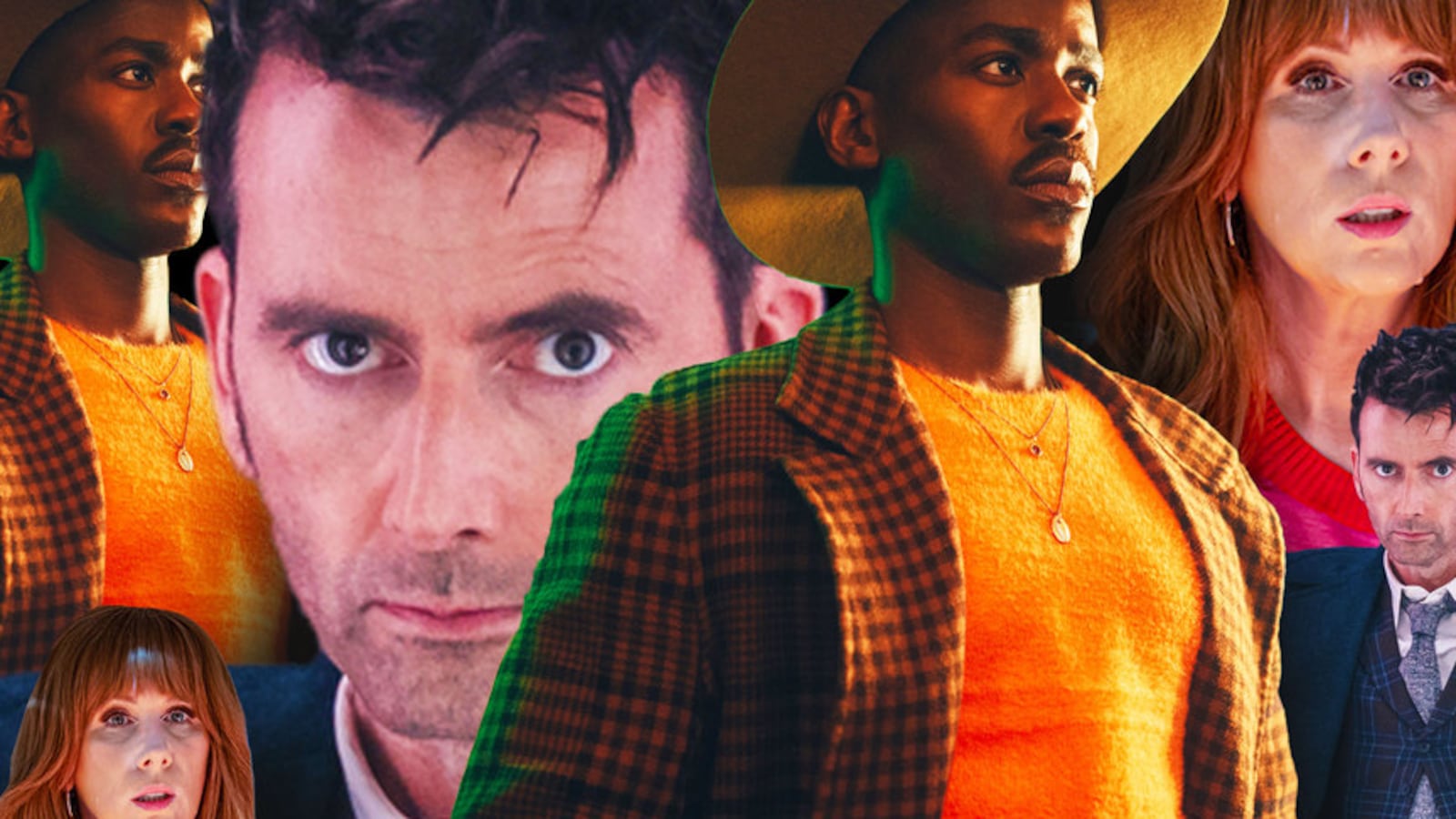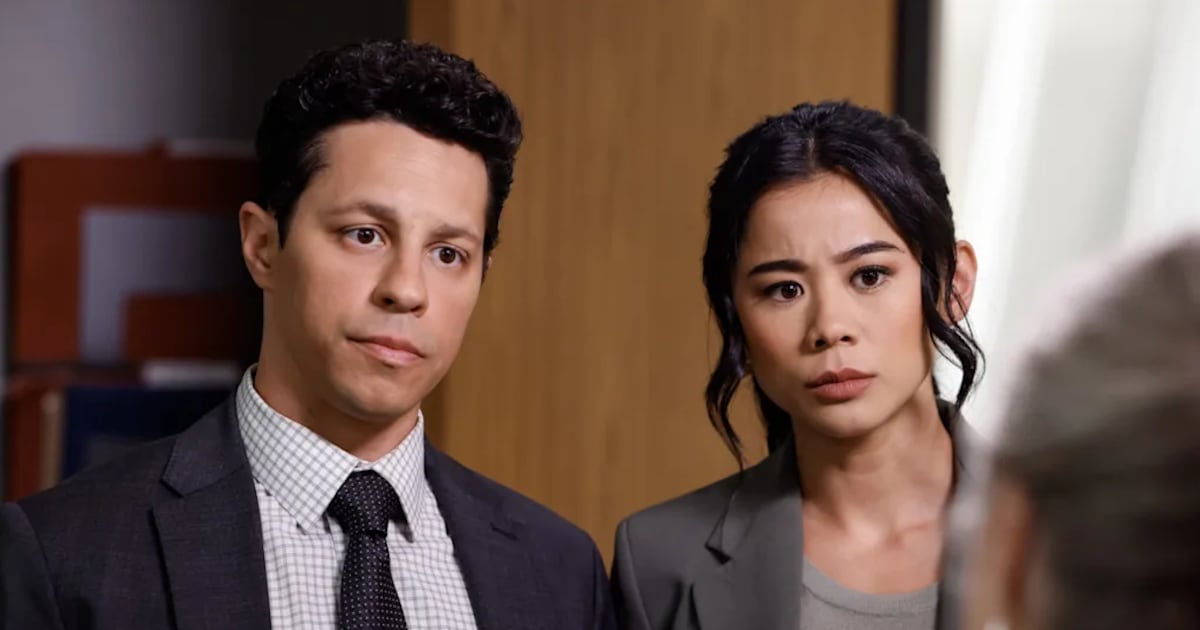You’re reading this for one of two reasons: You are a “Whovian,” a Doctor Who fan who wants to revel in the joy that is the newest iteration. Or you consider yourself Doctor Who-curious, and wonder if now’s the time to meet the Time Lord and his companions. Either way, you should know that the greatest sin in the Whoniverse is SPOILERS—so I will keep them to a minimum while telling you just why the Doctor’s return means joy throughout space/time.
Very quick primer for new Who watchers: The Doctor is a human-looking alien known as a Time Lord who travels through space and time in a blue TARDIS, a space-and-time machine that looks like an old British police box. He travels with human companions, and the adventures are never more than PG-13—usually more PG-rated, with a hint of action/adventure scariness. The BBC show has been on for 60 years, making it the longest-running sci-fi series, and has starred 13 different actors as the Doctor, either as the primary version of the character or in flashbacks. There are 15 versions of the Doctor considered “official,” because the character can regenerate into a new body (or actor) when they’re near death (or the actor wants to move on).

David Tennant in Doctor Who Special 1, “The Star Beast”
Disney+The BBC rebooted the show in 2005 after a long hiatus, and it’s ebbed and flowed in popularity since. David Tennant’s 10th Doctor and his companion Donna Noble, played by Catherine Tate, were notable fan favorites. Thirteen years after their tenure on the show ended, Tennant and Tate returned—but only for the three Christmas specials, which celebrated the 60th anniversary of the show before the new season starts in earnest on Disney+ Christmas Day.
Last year, we learned that the next Doctor was going to be Sex Education and Barbie alum Ncuti Gatwa. The fun surprise, however, was that when Jodie Whittaker, the first lady Doctor, regenerated at the end of last season, she turned not into Gatwa, but into Tennant. So if you’re counting, that’s David Tennant as Doctor numbers 10 and 14 (these are considered distinct regenerations, not the return of 10), and Ncuti Gatwa as 15.

Ncuti Gatwa in Doctor Who holiday special, “The Church on Ruby Road”
Disney+The Tennant regeneration surprise was well-received by fans and critics. Tennant’s general popularity has not diminished over the 15 years since he last donned the Doctor’s too-tight suit and Converse. He had recently been a huge hit with the nerds as a gay (pan?) demon (angel?) on Good Omens. Season 2, which streamed this summer, reportedly did very well on Prime; fans of both the book and Season 1, which came out way back in the before-times (2019), loved it. (They also were desperately sad when it ended and have been petitioning Amazon to greenlight Season 3.) All this to say: Tennant can command a fandom.
The future is bright for Whovians, who received the Christmas specials with open arms. There were Easter eggs galore for the fans: We got an “Allons-y!” within the first five minutes. Not only is Donna back, but so is her protective mother and, briefly, Bernard Cribbins as Donna’s grandad Wilfred in his final appearance (the actor died this year at the age of 90). There are references to past adventures and characters, and a few surprises that were not revealed ahead of airing—a Christmas gift for lovers of the show.
Speaking of gay, the three Christmas specials—the last of which, “The Giggle,” premiered on Disney+ Saturday—don’t shy away from being LGBTQIA+-inclusive. Even more, they were truly celebratory of Doctor Who’s gaiety, something the show has been criticized for avoiding in the past. Last season, Jodie Whittaker’s Doctor maybe-kinda had feelings for her female companion, Yaz (Mandip Gill). But nothing came of it, an example of “queer coding” that disappointed many fans.
Based on the specials alone, the new iteration has made many changes to right this wrong. There are several times when characters use the scientific definitions of “binary” and “non-binary” to play with and symbolize non-binary inclusion. A trans actor, Yasmin Finney, plays Donna’s daughter, Rose. In the second special, we get a Loki-style throwaway regarding the 14th Doctor’s fluid sexuality, which perhaps applies to all regenerations. The show no longer has to relegate its gay content to side character and problematic human Jack Harkness (John Barrowman). Tennant has long-been an ally, especially to the trans community, and it’s such a breath of fresh air for a show and its team to embrace their viewership and the full breath of humanity.

David Tennant and Catherine Tate in the Doctor Who holiday special “Wild Blue Yonder”.
Disney+The use of pronouns on Doctor Who has also time-traveled to the present. In the first special, “The Star Beast,” there’s a conversation about pronouns that neither talks down to the audience nor leaves them with any ambiguity regarding how this show feels about gender expression. In interviews, Ncuti Gatwa refers to the Doctor with they/them pronouns, encompassing the two genders the Doctor has presented thus far and potentially indicating that Gatwa’s Doctor will be nonbinary.
Not only is the future of Doctor Who is more LGBTQIA+ friendly than ever, the series has also made some important decisions regarding disability representation. In press about the Children in Need “minisode” special featuring a classic Whovian “bad guy,” Davros, newly reinstated showrunner Russell T. Davies says the team made a decision to remove the baddie’s scars and wheelchair, to help combat the “long tradition of associating disability with evil”: “Time, society, culture, and taste has moved on,” he said. “When the world changes, Doctor Who has to change as well.”
Meanwhile, in “The Star Beast,” a member of the government organization that helps the Doctor protect Earth, UNIT (played by Ruth Madeley), fights bad aliens with weapons fitted to her wheelchair. In the third episode, which features UNIT again, other characters challenge assumptions about physical disability.
When Tennant makes way for Gatwa after his turn as the fourteenth Doctor, we will finally have a Black Doctor. His tenure kicks off Dec. 25, with the final (pre-)Christmas special setting up his introduction to the series. Astute fans will point out a subplot in Whittaker’s tenure that included a Black female Doctor, played by Jo Martin, but this will be the first time a person of color has led the charge as the main protagonist.
Besides the widely anticipated entrance of Gatwa, the next season’s guest stars are already creating buzz. Jinkx Monsoon of Ru Paul’s Drag Race is in Gatwa’s first episode. Jonathan Groff (Frozen, many Broadway shows including Merrily We Roll Along currently) has shown up in press footage, dressed as if for an Austenian ball. Bridgerton’s Nicola Coughlan will guest star as well, though she’ll not be joining Groff in the Regency Era garb.
While it’s bittersweet to say goodbye to Tennant and Tate after only three more episodes, the wrap-up of their character arc was handled in a way that made long-term fans happy and sets up the new season nicely. And better yet, it cedes the floor to a new flavor of Who: When the next season premieres on Disney+, it will be labeled as Season 1, signaling a new age for the old show.






